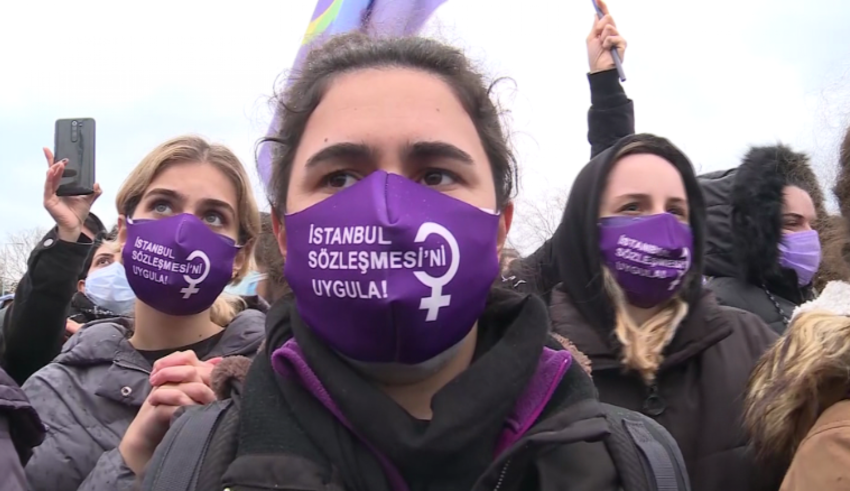
Official reports estimate that globally 736 million women, since the age of 15, have experienced physical and/or sexual violence at least once in their lifetime. The situation is even more alarming if we consider that it is almost one in three women worldwide. Most violence against women is intimate partner violence, ranging from 27 percent of women aged 15 and older globally and 22 percent in high-income countries and Europe. And all these before the COVID-19 pandemic stroke. Only in the first year of lockdown, 81,000 women and girls were killed globally, of which 58 percent of the killings were executed by an intimate partner or a family member. These numbers equate to a killing of a woman or a girl every 11 minutes. If these huge figures seem unrelatable for some, on a national level indicative are the femicide records in Italy between 1 August 2021 and 31 July 2022 that show 125 homicides of women, 17 femicide cases in Greece and 1,312 cases in Russia in 2021.
As the numbers suggest, gender-based violence remains at high levels, even after almost 10 years since the Council of Europe Convention on preventing and combating violence against women has come into force. The Istanbul Convention is the first legally binding international instrument that specifically targets violence against women and domestic violence, establishing a framework of legal and policy measures that include protection, prevention, and prosecution. Its importance stems from the innovative developments that brings as it recognizes the violence against women as a human rights violation, establishes a gender approach to violence, and requires the criminalization of all of the four offenses, namely physical, sexual, psychological, and economic violence. The Convention was a major step forward for the LGBTQ+ society as well, since provides the implementation of all the measures without discrimination on grounds of sexual orientation or gender identity. Finally, migrant women and women asylum seekers were not excluded from its protective framework.
Despite its significant value, it took three years for the EU to sign the Convention, and only in July 2022 was finally signed by all EU Member States, and ratified by 21. As for the rest, there has been a pushback since Bulgaria, the Czech Republic, Hungary, Latvia, Lithuania, and Slovakia have not ratified the Convention, Poland has expressed its intention to withdraw from the Convention while Hungary has formally rejected it. The main arguments of the anti-ratification opponents stem from conservative ideas over the notion of gender and family, outdated traditional values, and the involvement of religious actors. Turkey is the only country to pull out of the Convention.
In 2011, when the treaty was opened to signature, Turkey immediately expressed its full support, being the first to sign it. After a year, on International Woman’s Day, Turkey officially ratified the Istanbul Convention, after the unanimous approval of the Parliament. However, it came as no surprise when almost ten years later President Recep Tayyip Erdogan announced the withdrawal of Turkey’s membership in the Istanbul Convention. President’s move came at a time when Turkey’s rates of physical and sexual violence against women have reached 40%, out of which only 10% sought help, while in 2020 at least 300 women were murdered, and another 117 women died due to unknown causes. Although Turkey’s exit received severe criticisms and prompted widespread protests, President Erdogan advocated that the Istanbul Convention served to spread western ideologies that were putting Turkey’s social and family values at risk. In reality, it was a well-planned decision by the President to remain in power by retaining his voting bloc on the one side, aiming at satisfying the conservative voters who were disappointed by Turkey’s economic crisis, and winning new allies on the other, like the Islamist Felicity Party (SP).
This summer two more countries, the UK and Ukraine, ratified the Council of Europe Convention on preventing and combating violence against women. Following the Russian invasion and amid its EU membership bid, Ukraine ratified the Convention on June 20. A month later, and ten years after first signing it, the UK finally adopted the Istanbul Convention with reservations to Articles 44 and 59. This means that the UK excludes from the protective framework migrant women, leaving them reliant on their abusers for their residence status. However, the UK is not the only country that ratified the Convention with a reservation to article 59. Nine others have left migrant women unprotected from gender-based asylum including Armenia, Cyprus, Germany, Liechtenstein, Malta, Monaco, North Macedonia, Romania, and Slovenia.
It is important to understand that the Istanbul Convention aims at the protection of all women and all girls from violence under all circumstances without discrimination on the grounds of gender identity, migrant status, or any other status and such aim should not be subject to the political agenda or other political and financial interests.
By The European Institute for International Law and International Relations.















